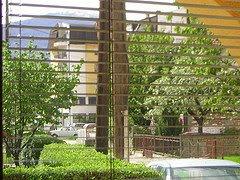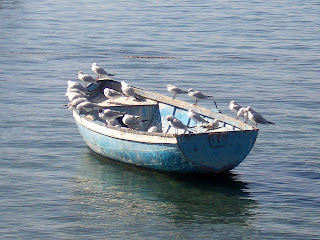Wednesday, December 17, 2008
Sunday, September 14, 2008
Wednesday, September 10, 2008
How do I download and install the LAME MP3 encoder?
LAME encoder to export MP3 files with Audacity.
Windows
Go to the LAME download page.
Under "For Audacity on Windows", left-click on the link "libmp3lame-win-3.97.zip" and save the zip folder to anywhere on your computer.
When you have finished downloading the ZIP folder, unzip it and save the file lame_enc.dll that it contains to anywhere on your computer.
The first time you use the "Export as MP3" command, Audacity will ask you where lame_enc.dll is saved.
In case of difficulty, please view the Audacity Wiki.
Windows
Go to the LAME download page.
Under "For Audacity on Windows", left-click on the link "libmp3lame-win-3.97.zip" and save the zip folder to anywhere on your computer.
When you have finished downloading the ZIP folder, unzip it and save the file lame_enc.dll that it contains to anywhere on your computer.
The first time you use the "Export as MP3" command, Audacity will ask you where lame_enc.dll is saved.
In case of difficulty, please view the Audacity Wiki.
Monday, May 5, 2008
Finishing the assignments, feedback
Now, that I am looking back at the OER course and everything I have done so far, I feel I want to start everything from the beginning and improve some of the work. Anyway, it's good I have a week more to add some things to the assignments. However, I will also visit the participants' blogs and leave comments there.
Having in mind the free culture issue, I went back to http://www.flickr.com/. This time I added image sets, included images on the map and changed the licence to media commons. You can view them here.
I have also uploaded more images on wikimedia commons. I can finally add licences and categorize images. At the moment I am making a video tutorial with "wink" on how to upload images on media commons. I still have problems with the podcasts.
I went back to http://lemill.net/community/anicapetkoska and practised the option to create learning resources, by adding media, multiple choice questions and open ended questions. I uploaded: instructions for a For-page brochures, presentation assessment, an ostrich chicks image.
The rest of the feedback, you can read on wikiversity's link:
http://en.wikiversity.org/w/index.php?title=Composing_free_and_open_online_educational_resources/Critique_and_feedback
Having in mind the free culture issue, I went back to http://www.flickr.com/. This time I added image sets, included images on the map and changed the licence to media commons. You can view them here.
I have also uploaded more images on wikimedia commons. I can finally add licences and categorize images. At the moment I am making a video tutorial with "wink" on how to upload images on media commons. I still have problems with the podcasts.
I went back to http://lemill.net/community/anicapetkoska and practised the option to create learning resources, by adding media, multiple choice questions and open ended questions. I uploaded: instructions for a For-page brochures, presentation assessment, an ostrich chicks image.
The rest of the feedback, you can read on wikiversity's link:
http://en.wikiversity.org/w/index.php?title=Composing_free_and_open_online_educational_resources/Critique_and_feedback
Monday, April 21, 2008
Sharing Videos
There are several possibilities to make videos:
- The one above was made by a web cam. It's published on blip tv, because it supports Creative Commons licenses.
- It's not possible to upload http://www.youtube.com/ videos, without converting them for wikiversity/ wikimedia. However, as Hans's video uploaded on Lemill shows, these videos may be used for creating free educational resources.
- The you tube video with the American President is a model how to put smaller clips together.
- Power Point Presentations can be uploaded at http://www.slideshare.net/ . This site supports Creative commons licenses. PPPresentations can either be added as links to websites, blogs and wikis or embeded. The google docs presentation are for collaborative work on presentations.
- However, WINK seems more proffesional, or something that I can't make yet. I installed the wink software. I read the tutorial and made the first small steps. Here is what it should do.
- http://www.Dotsub.com , is a web tool which supports CC licences and subtitles in any language. When uploading avideo, the video uploader and producer decides who will have rights to caption and/ or translate it.
- I translated this video in Macedonian language.
I will probably upload a video, on this web site, although the Conversation Week, 2008 is over now. Upps...I have to check the CC licence for translation...
Friday, April 11, 2008
Share Audios as Educational Resources Online

1. I installed audacity and LAME. (You won't need to install these two if you already have an audio recorder on your computer that produces MP3 files)
2. YouTube tutorial for this http://www.youtube.com/watch?v=r5K1ZsoO1sU
3.Once you have the software installed the fun begins; you can find a number of audacity tutorials on YouTube
4. After creating a few MP3 podcasts you can upload them to some of the podcasting services like;
Odeo - I have difficulties here. I signed up with beta odeo, however I got a return message that they will notify me when beta odeo is ready to start working again
Switchpod I registered and uploaded my first switchpod here.
My RSS feed is: http://www.switchpod.com/users/anicapetkoska/feed.xml
5. We need to find some Open podcast hosting sites
read about podcasting
read about Vorbis Ogg, it is an important part of openness and sound files
read about the creative commons and their connection to audio. Consider using CC licensed music files in your OER.
Audacity and Podomatic (not a free one, after two weeks, they asked for money for the service they offer)
2. YouTube tutorial for this http://www.youtube.com/watch?v=r5K1ZsoO1sU
3.Once you have the software installed the fun begins; you can find a number of audacity tutorials on YouTube
4. After creating a few MP3 podcasts you can upload them to some of the podcasting services like;
Odeo - I have difficulties here. I signed up with beta odeo, however I got a return message that they will notify me when beta odeo is ready to start working again
Switchpod I registered and uploaded my first switchpod here.
My RSS feed is: http://www.switchpod.com/users/anicapetkoska/feed.xml
5. We need to find some Open podcast hosting sites
read about podcasting
read about Vorbis Ogg, it is an important part of openness and sound files
read about the creative commons and their connection to audio. Consider using CC licensed music files in your OER.
Audacity and Podomatic (not a free one, after two weeks, they asked for money for the service they offer)
I managed to upload my first podcast on http://www.podomatic.com/.
It's in Macedonian language though. I read Hans comment on how to improve the quality of the audio files.
http://anicapetkoska.podomatic.com/
http://anicapetkoska.podOmatic.com/entry/2008-04-11T15_42_08-07_00
My RSS feed http://anicapetkoska.podOmatic.com/rss2.xml
It's in Macedonian language though. I read Hans comment on how to improve the quality of the audio files.
http://anicapetkoska.podomatic.com/
http://anicapetkoska.podOmatic.com/entry/2008-04-11T15_42_08-07_00
My RSS feed http://anicapetkoska.podOmatic.com/rss2.xml
Monday, April 7, 2008
A Picture is Worth a Thousand Words


http://commons.wikimedia.org/wiki/User:Anicap
This is the first time I am using wikimedia commons. I have registered and uploaded the image bellow. Here is the link to the image http://commons.wikimedia.org/wiki/Image:Survival.jpg

This is the first time I am using wikimedia commons. I have registered and uploaded the image bellow. Here is the link to the image http://commons.wikimedia.org/wiki/Image:Survival.jpg

Will she sell enough herbs to bring food at home?
http://commons.wikimedia.org/wiki/Main_Page
http://commons.wikimedia.org/wiki/Commons:Media_of_the_day
These are audio or video files selected for display on the Main Page as the Media of the day. Publishing them on this page allows users to translate the captions into other languages.
Media of the Day provides one freely-licensed audio or video file each day.
The current Media of the day can be included on a page using the template{{Motdwidth=300float=rightlang=en}}The audio or video file can be accessed using[[Media:{{Motd/{{CURRENTMONTH}}-{{CURRENTDAY}}}}]]The caption can be accessed using{{Motd-en/{{CURRENTMONTH}}-{{CURRENTDAY}}}}
Wikimedia Commons uses Ogg Vorbis files for sound files and Ogg Theora for video files. You can learn which software and which codecs you need to play media files.
Requirements
First you need playback software. By default you can use the Windows Media Player, but you need extra codecs (see below). Alternatively you can use the free VLC media player or MPlayer. They can play Ogg as installed.
Downloading required Codecs
Now you have to download a necessary extension (Codec), so that your media player will be able to play sound and video files with the Ogg Vorbis file type (sound files) and with the Ogg Theora file type (video files).
Load the website http://www.illiminable.com/ogg/downloads.html#stable and click the link on the right hand side Download Now.
The file size is 800 kB. After you downloaded it to your hard disk, open the file and follow the installation guide.
http://commons.wikimedia.org/wiki/Main_Page
http://commons.wikimedia.org/wiki/Commons:Media_of_the_day
These are audio or video files selected for display on the Main Page as the Media of the day. Publishing them on this page allows users to translate the captions into other languages.
Media of the Day provides one freely-licensed audio or video file each day.
The current Media of the day can be included on a page using the template{{Motdwidth=300float=rightlang=en}}The audio or video file can be accessed using[[Media:{{Motd/{{CURRENTMONTH}}-{{CURRENTDAY}}}}]]The caption can be accessed using{{Motd-en/{{CURRENTMONTH}}-{{CURRENTDAY}}}}
Wikimedia Commons uses Ogg Vorbis files for sound files and Ogg Theora for video files. You can learn which software and which codecs you need to play media files.
Requirements
First you need playback software. By default you can use the Windows Media Player, but you need extra codecs (see below). Alternatively you can use the free VLC media player or MPlayer. They can play Ogg as installed.
Downloading required Codecs
Now you have to download a necessary extension (Codec), so that your media player will be able to play sound and video files with the Ogg Vorbis file type (sound files) and with the Ogg Theora file type (video files).
Load the website http://www.illiminable.com/ogg/downloads.html#stable and click the link on the right hand side Download Now.
The file size is 800 kB. After you downloaded it to your hard disk, open the file and follow the installation guide.
Subscribe to:
Comments (Atom)
